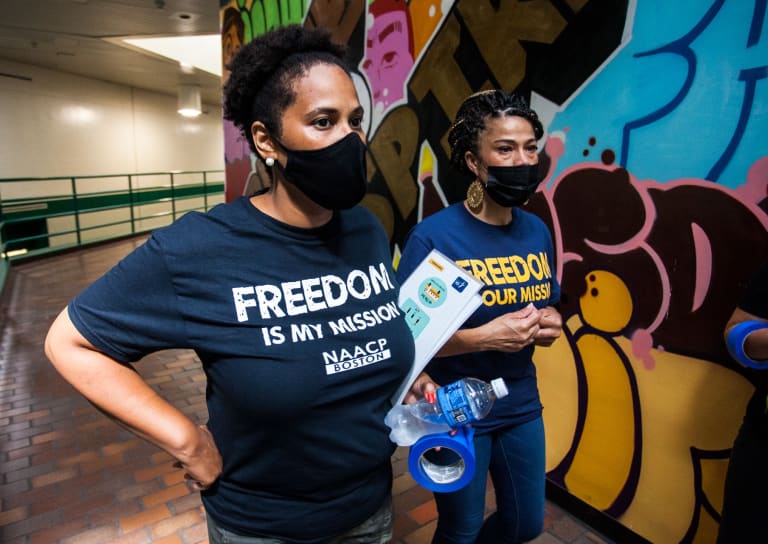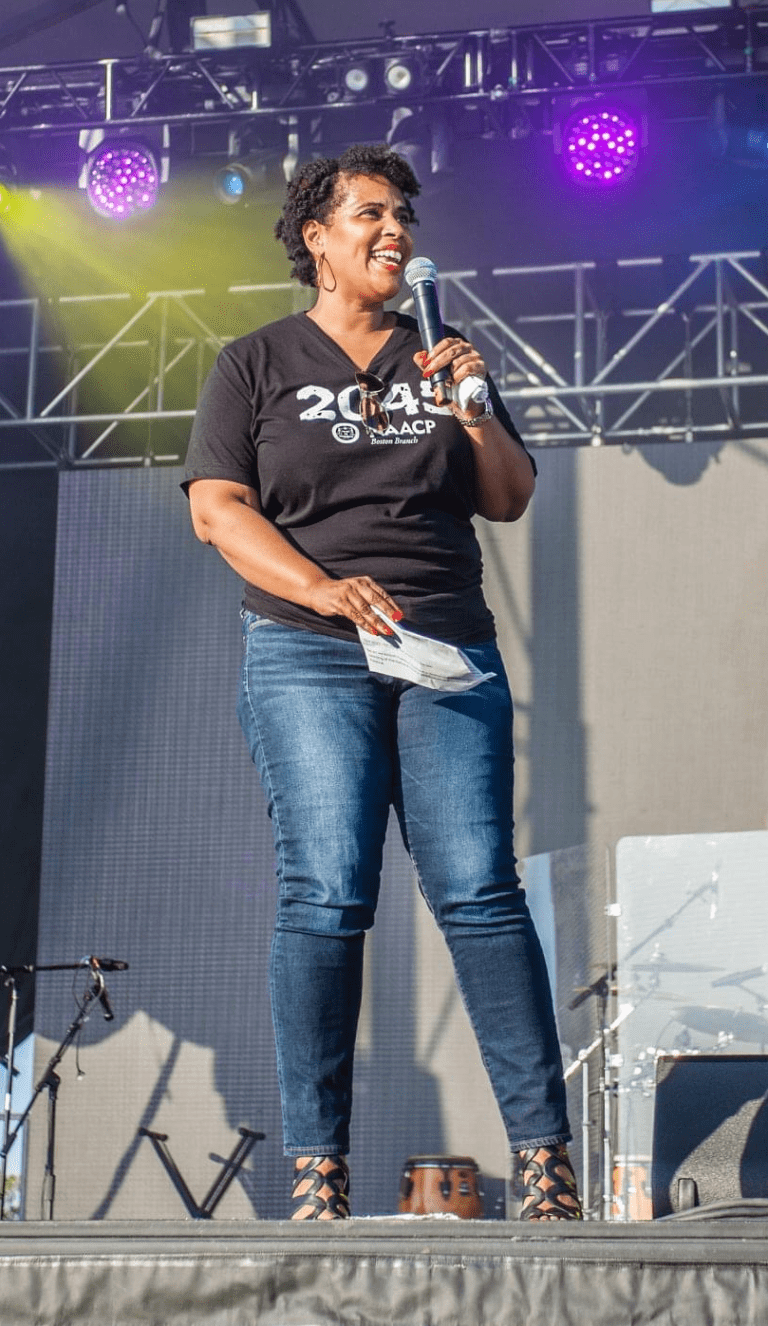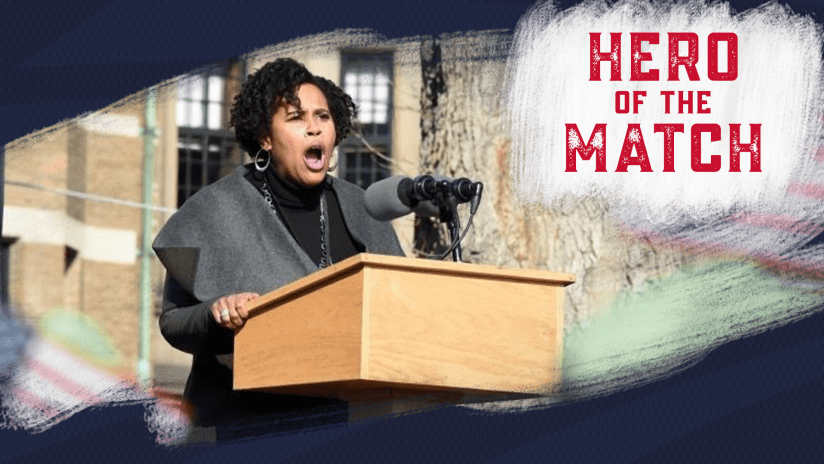Tanisha Sullivan, president of the NAACP Boston Branch and a native of Brockton, Mass., will be honored as the New England Revolution’s “Hero of the Match” for their meeting with the Philadelphia Union on Thursday, August 20, at Gillette Stadium.
Revolution players will wear special C.H.A.N.G.E. patches on their jerseys for Thursday’s match, and those jerseys will then be auctioned off with proceeds to benefit NAACP Boston.
FOXBOROUGH, Mass. – From a young age, Tanisha Sullivan knew that she would never sit idly by, but would instead play a leading role in the fight for equality and racial justice in the Boston area.
Born and raised in Brockton, Mass., Sullivan grew up with a deep understanding of the discrimination and oppression her own family had faced for generations, and that led to her involvement with the National Association for the Advancement of Colored People (NAACP) while still in high school.
College briefly took Sullivan away from home as she attended the University of Virginia, but she soon found herself back in Massachusetts, graduating from Boston College Law School on her way to becoming a full-time attorney.
Sullivan’s commitment to the NAACP, however, has never wavered. In January of 2017 she moved into a leadership role with the organization, named president of the Boston branch, where for the past three-and-a-half years she has focused not only on the elimination of systemic racism, but also on issues of gender parity and gender equity that directly impact women of color.

It’s a purely volunteer position, but the cause could not be closer to Sullivan’s heart.
“I come from a family of Bostonians, and for me, this work really is about helping the city, helping the greater Boston area, to be a place where truly everyone has the opportunity to thrive,” she said. “In this role with the NAACP, I really see it as an opportunity for me not only to continue to help bring about a better Boston, but also I am very fortunate because I’m benefitting from a lot of the work that they’ve done and folks of their generation have done.
“I’m able to benefit from the progress of the city on racial equality and gender equity, but at the same time, I’m in a position now where I can help to push us even further.”
Much of that work has been in the fight to pass meaningful legislation, and Sullivan noted recent economic and environmental bills that have focused on the intersection of race with regards to those issues. Police reform, of course, has been another significant focus, particularly in light of the nationwide response to the shocking death of George Floyd in late May.
In June, the city of Boston named Sullivan to a commission tasked with studying police guidelines – including use of force – and what she has seen in recent months is true momentum behind the need for reform, with widespread support the likes of which has never been seen before.
“The NAACP is 100-plus years old, so we’ve been doing this work for a very long time, and even up through the Civil Rights Movement, the NAACP has been on the frontlines,” said Sullivan. “Never before have we seen the type of participation from people of all walks of life in this work.
“That really is one of the bright spots in all of what I’m seeing, is that we have people from all backgrounds who are coming to understand what really the issues have been, and in coming to understand those issues, we have more people who are saying, ‘You know what, we want to work alongside you to help address these issues.’ It’s incredibly powerful.”
Sullivan believes the current momentum behind the movement presents a real opportunity for change, particularly as many people of color have been empowered to speak up about their own experiences with racism and oppression for the first time, making these issues deeply personal.
But what sparked this momentum? George Floyd’s murder at the hands of police wasn’t unique in its gruesome nature – Breonna Taylor, Eric Garner, Elijah McClain, Tamir Rice, and countless others have suffered similar fates – but it was exceptional in the media coverage it received.
And unable to leave home in the midst of a pandemic, the general public couldn’t look away.
“The COVID-19 pandemic really caused our world to come to a halt,” said Sullivan. “I’ll tell you, those eight minutes and 46 seconds were seen by people across this country, and it is hard to be human and watch for eight minutes and 46 seconds, a grown man cry out for his life, and not be changed.
“I really do think it’s the tragedy of the COVID-19 pandemic, and the conditions it created for us all focused on the media, and the reporting, and then here you have imagery of George Floyd’s murder – eight minutes and 46 seconds forever seared into the minds of millions. You can’t un-see that.
“We’ve been advocating for literally hundreds of years against the dehumanization of people in this country, but we’ve been talking about it. It has never been seen in that way before by millions of people. And at our core, the majority of us are very good people, and you cannot be a good and decent person, see something like that, and not be convicted to take action.”

Millions have been driven to take action all across the United States in recent months, as protests from coast to coast have kept these issues at the forefront of the national conversation. Sullivan has seen that action firsthand in Boston, which has featured several demonstrations as citizens have called for police reform and meaningful legislation to end the systems of oppression.
What’s been most promising, Sullivan said, is that the protests haven’t been superficial – in some ways they’ve already led to actionable change, including at the corporate level, where Black employees and executives have felt emboldened to speak up about the discrimination they’ve faced in the workplace.
“The protesting and the demonstrations in the street were very, very important, and they remain very, very important,” Sullivan said. “But what is incredibly inspiring and gives me great hope is that the protests in the streets have translated into, or converted into, I think, very meaningful, actionable conversations within boardrooms, across different industries about change that needs to happen, not just from a legislative standpoint, but also from a policy standpoint.”
Now, as organizations like the NAACP strive to keep these conversations in the national spotlight and ensure that this movement leads to actionable, long-term change, everyone has a responsibility to keep the topics of racial injustice and equality engrained in the nation’s psyche.
That includes professional sports leagues, teams, and athletes, who have tremendously powerful voices and platforms, particularly at a time when much of the country is so keenly dialed in to their return to play. Whether it be the formation of Black Players for Change, pregame demonstrations, or the pervasive use of Black Lives Matter imagery, Major League Soccer and the New England Revolution have embraced that responsibility.
In fact, all of New England’s pro sports teams have stepped up to the challenge, standing up to racism and hate speech through the Take the Lead campaign since 2017, and Sullivan said the voices of athletes and their teams will continue to play a major role in the quest for change.
“I’ve always maintained that there’s great power in the voices – and in the collective voices – of our professional athletes,” Sullivan said. “I’m glad to see not only is that power being exercised for good, but also that as the players are lifting their voices, as the athletes are lifting their voices, that they do have the full support of the leagues and for the most part, the clubs. That is very, very important.”











